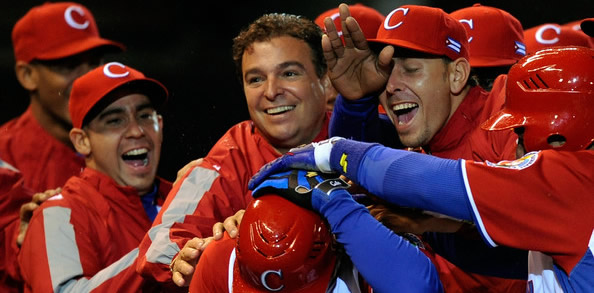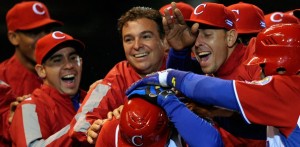
A 90-mile grand slam
HAVANA – Between veterans and newcomers, 16 Cuban baseball players are participating this season in the U.S. Major League.
“It’s not good for their well-being, not good for their families, not good for anyone. We lose, because when they leave they leave. They don’t return to play in the Cuban national team,” said the Cuban-born vice president of the International Baseball Federation (IBAF), Antonio Castro Soto del Valle, in an interview with ESPN.

Right away, he posits – as a possibility – a drastic change: Cuba can accept the fact that the athletes may live anywhere and come (or go) to defend their nation’s colors. In fact, they already can be hired by foreign teams.
“Cuba needs to change, too. We’re part of this world. It is a risk, yes, but we take risks at every moment in our lives,” said Dr. Castro Soto del Valle, a doctor who specializes in sports medicine and is one of the sons of Cuban leader Fidel Castro Ruz.
Interviewed by Paula Lavigne for the ESPN program “Outside the Lines,” Castro underscored his answer with a question: “Why couldn’t it be?” Why couldn’t they play there and here? More than an effective bunt, the IBAF executive has hit a grand slam, driving the ball 90 miles beyond the fence.
Tony Castro, as he is called, told ESPN that it would be best if the process occurs in a natural way, as it does everywhere else. Soccer jerseys everywhere bear names that are not native.
A considerable number of soccer players who represent clubs and countries are not natives of those countries. They have been imported from other nations and nobody finds that odd, but in international contests they wear the jersey of their country of origin.
Will the owners of U.S. teams allow Cuban-born players to return occasionally to the island to play against other national teams? According to the outdated laws of the embargo, Cuban players in the U.S. Major League cannot live in Cuba. And they cannot receive their salary there or spend part of it in their native country. The legislation combines attraction and trickery.
There are plenty of obstacles. The first one is the rusty vision of some functionaries, politicians or lobbyists in the U.S. Another one could be the quandary of the hiring teams over the coincidence of international sports events or the schedule of the championships in the players’ respective countries.
But in both cases such conflicting situations could be solved. The tough bone is represented by the senators in Washington and the hard line imposed on anything that had to do with that persistent island that has spent 54 seasons on the field.
“We need to change on both sides. This is a political situation, but we have to make realistic decisions,” said Antonio Castro to his interviewer. He gave as an example José Ariel Contreras, the pitcher from Pinar del Río who signed with the Chicago White Sox and this year visited his native province after a 10-year absence that seemed final.
“In the future, he can return and […] maybe build an academy to teach kids to play baseball. I have asked everyone, ‘Is that bad for us?’ No, I’m sure it isn’t. […] I love that idea,” Castro said.
Tony Castro’s statements carry a sign and a message. Just as Havana’s new travel policy has changed the much-debated issue of emigration, Cuba is pitching a slow curve for Washington to hit. Will it?

